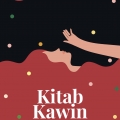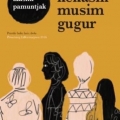It is a novel about the intricacies of art, religion, politics and history in a troubled Indonesia, but also about family, identity, motherhood, and the sisterhood of women.
Synopsis
Fall Baby (Penguin Random House: September 2019) tells the story of two women—Srikandi (Siri) and Dara, one a globetrotting visual artist, the other a political activist. Siri is the illegitimate daughter of Amba and Bhisma, the protagonists of Laksmi Pamuntjak’s award-winning first novel, Amba/The Question of Red. Dara is Siri’s best friend-turned foe. After almost a lifetime of soul-searching in different cities of the world, Siri—brave, brilliant, broken—seeks to escape the difficult realities of her family history by making a new life in Berlin. Just as she is starting to find her footing in her new home, both in art and in life, unexpected family circumstances and a changing political landscape compel her to return to Jakarta—and to confront not only the wounds of her past, but also the complex realities of faith, art and politics in Indonesia: from the daily frustrations of navigating between two cultures and her multiple selves to dealing with religious fanatics who deem her art blasphemous.
Even though Siri finds Jakarta immensely trying, she is surprised by the fact that she keeps prolonging her stay. She finds salvation not just through her renewed friendship with Dara, but also with the renewed mother-daughter bond she experiences with her stepdaughter Amalia. It is this relationship with her stepdaughter that brings Siri, much to her own amazement and wonder, closer to her mother Amba and their common history, and in so doing finds some semblance of closure and forgiveness.
Fall Baby is a story of seeing and unseeing, of freedom and censorship. Of East and West, of memory and identity. Of mothers and daughters, of fathers and daughters. Of making peace with one's parents' and one's own history. And ultimately, of the most unexpected yet precious gift of all: the sisterhood of women.
Praise for "Fall Baby":
-
More than a novel, Fall Baby is a sensual song of longing, loss and hope.
- David van Reybrouck
-
Fall Baby is a moving, intriguing novel about the wandering soul of a female artist, the lost soul of friendship and family, the broken soul of home and the painful process of reconciliation with one’s own traumatic past and present. It is a candid and beautiful book about personal change that has the power to change anyone reading it.
- Ales Steger
-
A beautiful, wise, elegiac novel steeped in the colors, characters and politics of a troubled Indonesia ... Pamuntjak has emerged as one of Indonesia’s best known writers both at home and abroad and she introduces us to a culture and political history of which many of us know very little. This is a deeply moving book on her hugely complex but fascinating country, written in sparkling, precise prose and with luminous insights into the intricate web of art, politics, religion and history.
- Ahmed Rashid
-
“This is a beautiful, wise, deeply moving book on a hugely complex but fascinating country, written in sparkling, precise prose and with luminous insights into the intricate web of art, politics and history.”
- Ahmed Rashid, author of Descent into Chaos: The United States and the Failure of Nation Building in Pakistan, Afghanistan and Central Asia, contributor to New York Review of Books
-
“Fall Baby is a beautiful, big-hearted and absorbing novel about personal change that has the power to change anyone reading it.”
- Alés Steger, poet, author of The Book of Things, Above the Sky Beneath the Earth, Protuberance and Berlin
-
“More than a novel… Fall Baby is a sensual song of longing, loss and hope.”
- David van Reybrouck, historian, author of Congo and Against Elections: The Case for Democracy
-
“There is melody and lyricism in the way Laksmi Pamuntjak writes, sentences that by turns sing and jolt. Entering the interior lives of the novel’s characters is akin to a stroll through an art museum. At times poised, at times wild, but almost always elegant.”
- Dee Lestari, author of Supernova, Perahu Kertas and Aroma Karsa, singer and songwriter
-
“Since the opening page, when Srikandi declares that she has two fathers, you won’t be able to put Fall Baby down until the last page … even though the novel centres on Srikandi, it tells the engrossing story of three generations of women who constantly seek and find themselves, through conflict, loss and undying love.”
- Leila S. Chudori, author of Laut Bercerita and Pulang, senior editor, Tempo
-
“This novel not only perfectly captures the complexities of relationships between individuals—of longing and the desire for revenge, of love and hate—caught in a family history deeply wounded by politics, but also how art can be a liberating instrument against forgetting. With the storytelling deftness that is her trademark, Laksmi Pamuntjak pulls us deep into the story and makes us see the wound as our own.”
- Nezar Patria, Editor-in-Chief, The Jakarta Post
-
“This novel is yet another milestone in Laksmi Pamuntjak’s achievement as an important figure in the development of the Indonesian novel … Literature is how an author presents an idea, not the idea itself, which has remained the same since literature was conceived. What immediately bewitches me in Pamuntjak’s style is her use of the long and short paragraph as a literary device. These leaps, and the resulting music, is something our literature will do well in adopting.”
- Sapardi Djoko Damono, Indonesian poet laureate
-
“In this novel, Pamuntjak cracks open the global contemporary art world with extraordinary force and vividness—market intrigue, sex and love, the relentless drive for fame. You’ll also find artists who define their times, from the modernism of Vermeer, Munch and Matisse to the political art of Sudjojono and Djoko Pekik. The novel also frames the trajectory of art history within a fiercely women artist-driven narrative, something you rarely see in the canon: here, you will find the powerful works of Käthe Kollwitz and Louise Bourgeois, the abstract expressionism of Umi Dahlan and the daringly subversive sexuality of I GAK Murniasih.”
- Alia Swastika, art curator
-
“Laksmi Pamuntjak grew up in between cultures, languages and arts. Here she mobilises the urban Asian woman’s precarious cosmopolitanism to explore a painful part of Indonesian history which continues to mark, and some might say, mar, the nation’s experiment with democracy.”
- Professor Emeritus Krishna Sen, University of Western Australia; Fellow, Australian Academy of the Humanities
-
“Siri, agile and mesmerising in Pamuntjak’s hands … is a bright and beautiful star in the rich and intricate web of human relationships we call Life.”
- Associate Professor Dwi Noverini Djenar, Dean of Indonesian Studies, the Department of Culture and Languages, University of Sydney
-
“Fall Baby is a gift from one of Indonesia’s most treasured contemporary writers … Savour it for its incandescent prose, its rich layering of the past within the present, and the way in which it reminds us that history is never black and white.”
- Dr Natali Pearson, Sydney Southeast Asia Centre, University of Sydney
-
“A rich and layered novel: on the one hand the story of an individual’s quest for identity, on the other the history of art and a nation’s struggle.”
- Amir Sidharta, art curator, founder of Sidharta Auctioneer

